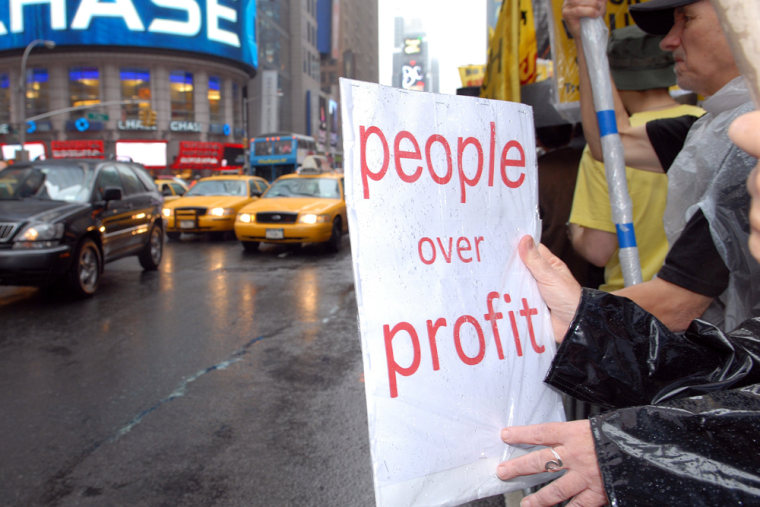As politicians and business leaders struggle to reach a deal on a $700 billion bailout for Wall Street, anger is reaching the boiling point on Main Street if readers’ e-mails to msnbc.com are any indication.
In less than 48 hours, nearly 2,000 readers filled out and submitted their view of the bailout and the U.S. economy in general in response to a Gut Check America appeal asking them to vote on their top economic concern and describe how it is affecting their lives.
Many readers expressed fears over the immediate, tangible fallout from the financial crisis, including lost homes, plummeting 401(k) values and inflation.
But the overriding message was one of righteous indignation from those who see the American dream receding.
“I have had to pull from my 401(k) to make ends meet,” wrote one reader, Anita Vasquez of Albuquerque, N.M., who was laid off a year ago and ended up taking a job for half the pay. The idea of the massive “payoff” to Wall Street makes the 54-year-old apoplectic, or, as she put it, “pissed off in New Mexico!”
Similar messages came from all corners of the country.
“I am 70 years old and still working because I cannot afford not to,” said Patricia Lacroix of Methuen, Mass. “Because of greed and corruption, it has come to this. … Help the middle class now!”
“My greatest concern is being able to send my 16-year-old son to college,” wrote another reader, Angela Cilluffa of Covington, La. “I have started to research scholarships, grants and loans, but I am afraid they will not come through. My son works very hard in school and is doing very well. He deserves every opportunity.”
‘What's next?'
Disbelief and despair also were prominent in many responses.
“My 401(k) has lost 20 percent of its value in two weeks,” wrotePaulFrongillo of Carver, Mass. “What’s next?”
Other readers said they are anxious because they don’t know what is in the financial rescue package that Congress is working on and whether it will help everyday Americans as well.
Kate Keim of Harrisonburg, Va., said she was wondering whether “or how the bailout is really helping the people more than hurting us. The word ‘bailout’ sounds as if the bad guys are getting a pass. Are they? I honestly don't know.”
Charleen Spalding, of Helena, Mont., posed a similar question. “Will this stop the bleeding?” she wrote. “Who will get bailed out next?”
The fact that the horse trading on the financial rescue is going on behind closed doors is not unusual, but the lack of transparency on such far-reaching and costly legislation appeared to be fueling distrust.
Some readers are suspicious
“We are not being given the full picture, and that is what is scary,” said Richard Jurado, of Lake Saint Louis, Mo. He said the market alone should decide the fate of the financial giants.
“Who was managing the books?” he asked. “Why wait until the last minute to bring this problem to the forefront? It almost appears as if they knew that the government would bail them out.”
To Jurado, it would be better to just let the chips fall. “The government will eventually run everything if we do not stand up for capitalism and free enterprise,” he says.
Another theme that emerges from reader responses is the sense that the United States is overextended.
Bill Demars of Burton, Mich., who signed himself “Fed Up,” wrote that what he found most alarming is “the fact that the U.S. is spending so much money on bailouts that the government isn’t even thinking about the amount we are spending on aid for other countries and wars. … The government of the United States needs to take care of the U.S. first.”
‘We ... deserve better’
Dwaine Pope of Longview, Texas, said he is more concerned that the people involved in forging the solution are not up to the job and are too partisan too be trusted.
“The political structure of the U.S. government is too divided to provide an unselfish solution to the economic crisis,” he wrote. “(The parties) have a Hatfield vs. McCoy mentality. We need a true ‘non-partisan,’ ‘non-political’ group of citizens to find a cure.”
In closing, he sounded another theme that surfaced in many responses: “We are honest, hard working people and deserve better,” he wrote.
